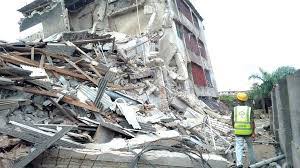The Federal Government has announced plans to inaugurate the National Building Code Advisory Committee as part of efforts to address the rising cases of building collapses across the country. The move follows the recent launch of a Ministerial Task Team to investigate the root causes of structural failures in Nigeria.
Minister of Housing and Urban Development, Ahmed Musa Dangiwa, disclosed this in a keynote address delivered at the Workshop on the National Building Safety and Structural Integrity Initiative held in Lagos. He was represented at the event by the Permanent Secretary of the ministry, Shuaib Belgore.
The workshop, organised by the Lagos State Government in partnership with the Federal Ministry of Housing and Urban Development, was a national campaign designed to halt the increasing wave of building failures. It brought together regulators, engineers, architects, builders, and other stakeholders in the construction industry.
Dangiwa described building collapse as a national tragedy that goes beyond the loss of lives and property. He said every incident erodes the trust between citizens, professionals, and government regulators. According to him, the government is determined to tackle the menace by enforcing stricter building regulations.
The Minister identified poor design, use of substandard materials, negligence by contractors, and weak enforcement of building codes as the major causes of frequent collapses in Nigerian cities. He said the National Building Safety and Structural Integrity Initiative would serve as a corrective measure.
The initiative, he explained, would include a nationwide audit of existing structures, a uniform inspection and certification system, and stricter enforcement of the National Building Code. It will also introduce the use of e-GIS mapping technology with real-time inspection reporting to strengthen oversight.
Dangiwa reiterated that the inauguration of the National Building Code Advisory Committee would provide a stronger framework for regulatory enforcement, coordination among professionals, and compliance monitoring in the construction sector.
He emphasised that the government’s goal is to protect lives and safeguard investments in housing and urban development by ensuring that buildings across the country meet approved safety standards.
Governor Babajide Sanwo-Olu of Lagos State, who also spoke at the event, praised the collaboration between federal and state authorities as a vital step towards safer and more sustainable cities. He noted that Lagos had already taken the lead with its Certified Structural Integrity Programme, which ensures that old and new buildings undergo regular checks before being approved for occupation.
Sanwo-Olu stressed that construction safety should not be left in the hands of government alone, but must be a shared responsibility between regulators, professionals, and the general public. “We must build for life, not for collapse,” he said.
The Governor explained that the growing urban population in cities like Lagos requires deliberate planning, strict monitoring, and cooperation from all stakeholders to ensure the resilience of the built environment. He added that residents also have a role to play by demanding accountability and avoiding patronage of unqualified builders.
Stakeholders at the workshop welcomed the initiative, describing it as a timely intervention that could reduce the alarming rate of building failures in the country if effectively implemented. Many also called for stiff penalties against developers and contractors who flout safety rules, stressing that the era of impunity in the construction industry must end.
With the rising cases of collapsed structures in major cities such as Lagos, Abuja, and Port Harcourt, the Federal Government’s plan is expected to set a new standard in construction safety while restoring public confidence in regulatory systems.
